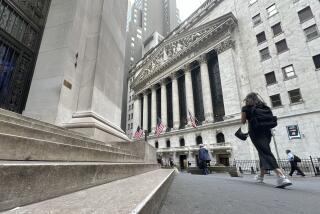Stocks post biggest decline since 2012 amid fears over Fed, Syria
The stock market finished its worst month in more than a year, with the specter of military action in Syria and reduced stimulus from the Federal Reserve weighing on share prices.
The Dow Jones industrial average and other major indexes suffered their biggest declines since May 2012 as investors stepped away from the powerful yearlong rally.
The Dow dropped 4.4% in August, while the Standard & Poor’s 500 gave up 3.1%.
Stocks have a lot going their way. The U.S. economy expanded at a stronger-than-expected 2.5% clip in the second quarter. Consumer confidence, despite easing in August, remains near a six-year high.
But the specter of a military strike in Syria added to a list of investor concerns that includes rising interest rates and a looming fiscal showdown in Washington.
The calendar also is working against the market. Much of Wall Street was on vacation in August, and September is the worst month for stocks historically.
“You’ve got a positive [investment] backdrop, but a toxic brew of news is causing people to take some chips off the table after a great run,” said David Dietze, investment chief at Point View Wealth Management in Summit, N.J.
The Dow on Friday dropped 30.64 points, or 0.2%, to 14,810.31. It’s down nearly 850 points, or 5.4%, from its Aug. 2 peak of 15,658.36.
The S&P on Friday receded 5.20 points, or 0.3%, to 1,632.97. The Nasdaq composite index was hit the hardest, falling 30.43 points, or 0.8%, to 3,589.87.
On a positive note, investors haven’t rushed for the exits. Trading volume is the lightest it’s been in years.
Stocks were overdue for a breather after rising for much of the year. The Dow is up 13% since Jan. 1 while the S&P has gained 14.5%. Both are the best annual showings since 2009, when the market rebounded from the 2008 global financial crisis.
“We have a market that got off to a very strong start” at the beginning of the year, said Alan Gayle, chief investment officer at RidgeWorth Capital Management. Now “some investors are saying ‘I got 20% on my stocks. I’m going to book a few profits.’ ”
The possibility of a military attack against Syria in retaliation for its suspected use of chemical weapons against its citizens rattled investors, who worried about upward pressure on gas prices and the potential for the U.S. to be drawn into a deeper or more prolonged conflict. President Obama said he was considering a “limited” attack.
That has come at a time when many investors believe that the strengthening economy will nudge the Federal Reserve to begin reducing its economic stimulus efforts. The central bank has been purchasing $85 billion of Treasury and mortgage bonds each month.
The Fed undoubtedly will move gingerly but interest rates already have started rising.
The benchmark 10-year Treasury note has risen to 2.78% from 1.63% in early May.
Investors also are worried that the internecine battle in Congress over the country’s debt limit could damage the economy.
“Do you really want to step up and buy” stocks now,” said James Paulsen, chief investment strategist of Wells Capital Management in Minneapolis. “I don’t think any of those things is going to kill us off, but it gives you pause.”
More to Read
Inside the business of entertainment
The Wide Shot brings you news, analysis and insights on everything from streaming wars to production — and what it all means for the future.
You may occasionally receive promotional content from the Los Angeles Times.










